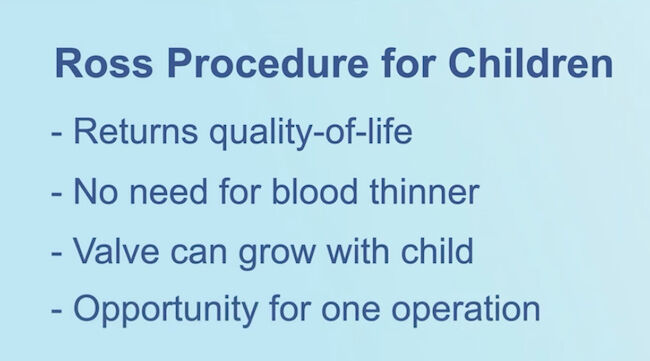The Ross Procedure and Children: What Should Parents Know?
Written By: Allison DeMajistre, BSN, RN, CCRN
Medical Expert: Vaughn Starnes, MD, Surgeon-in-Chief, Keck Medicine of USC
Reviewed By: Adam Pick, Patient Advocate, Author & Website Founder
Published: July 1, 2025
Congenital aortic valve disease is one of the most common pediatric valve disorders, typically due to a structural abnormality in the heart. Once symptoms such as fatigue, shortness of breath, and failure to grow at the same rate as other children become apparent, a surgical or transcatheter intervention is often required. It’s a stressful and confusing time for parents who are faced with critical decisions about their child’s health and future.
We received a great question on this topic from Ella, a parent in our community who needs guidance for her daughter. Ella asked, “My nine-year-old daughter has been diagnosed with severe aortic valve regurgitation. Is the Ross Procedure a good treatment for her?”
To answer Ella’s question, we met with Dr. Vaughn Starnes at the Society of Thoracic Surgeons Conference in Los Angeles, where he had just concluded teaching a Ross Procedure course for other physicians. Dr. Starnes is the Surgeon-in-Chief of Keck Medicine of USC in Los Angeles, California. Dr. Starnes is a world-renowned Ross Procedure expert having performed over 650 Ross Procedures during the past 30 years.
The Ross Procedure for Children
Here are the key insights shared by Dr. Starnes:
- The Ross Procedure restores a child’s quality of life. In response to Ella’s question, Dr. Starnes said the Ross operation is a good treatment choice for her daughter. “We’ve been using the Ross Procedure, particularly in children, since the early 1990s because it really returns the quality of life to the child. They don’t have to worry about playgrounds because they’re not on blood thinners.”
- The Ross Procedure may provide children with a long-term solution in which the valve grows with the child. “It’s the only operation we do in a child that the valve can grow with the child. It gives the opportunity for the child to have one operation,” said Dr. Starnes. “When it comes to children, if you put in a rigid valve like a mechanical or pig valve, it won’t grow with them. Pig valve replacements will last three to five years in a child. Mechanical valve replacements will last longer, but they must be replaced because they become too small as the child grows.”

Thanks Dr. Starnes and Keck Medicine of USC!
On behalf of Ella and all the patients and parents in our community, thank you to Dr. Vaughn Starnes for everything you and your team are doing at Keck Medicine of USC in Los Angeles, California!
Related links:
- 8-Year Old Gets Successful Ross Procedure Performed By Dr. Starnes
- Check out the new Ross Procedure Patient Education Center
- Surgeon Q&A: The Ross Procedure with Dr. Vaughn Starnes
Keep on tickin,
Adam
P.S. For the deaf and hard-of-hearing members of our patient community, we have provided a written transcript of our interview with Dr. Starnes below.
Video Transcript:
Adam Pick: Hi everybody, it’s Adam with HeartValveSurgery.com, and we’re in Los Angeles, California at the Society of Thoracic Surgeons Conference. I’m thrilled to be joined by Dr. Vaughn Starnes, who is the Surgeon in Chief of Keck Medicine of USC.
Dr. Starnes. It is great to see you again and thanks for being with me today.
Dr. Vaughn Starnes: Absolutely. My pleasure.
Adam Pick: We’re here at STS. I know you’re coming from a Ross procedure course that you just taught physicians. Att the same time, we’re getting patient questions coming at us from all over the world. This question is about one of your specialties, which is the Ross procedure. Ella asks, “Hi Adam, my nine year old daughter has been diagnosed with severe aortic regurgitation. Is the Ross procedure a good treatment option for her?
Dr. Vaughn Starnes: I think absolutely. In children, in particular, we’ve been using the Ross procedure since early 1990s. Because it really returns the quality of life to the child. They don’t have to worry about playgrounds because they’re not on the blood thinners. It’s the only operation that we do in a child that the valve can grow with the child.
It gives the opportunity for the child to have one operation. Children, in particular, if you put in a rigid valve, like a mechanical valve or a pig valve, it won’t grow with the child. Pig valve replacements will last three to five years in a child. Mechanical valve replacements will last longer, but they’ve got to be replaced because it becomes too small as the child grows.
Adam Pick: Wow. Well Ella, I hope that helped you. And just so you know, Dr. Starnes performed a Ross procedure on me nearly two decades ago, and I have had an extraordinary life with no restrictions. So Dr. Starnes, whether it’s with a child or an adult, I can’t thank you and your team enough at USC for all the great work you’re doing with the Ross procedure. Thanks for being with me today.
Dr. Vaughn Starnes: Thank you, Adam.





